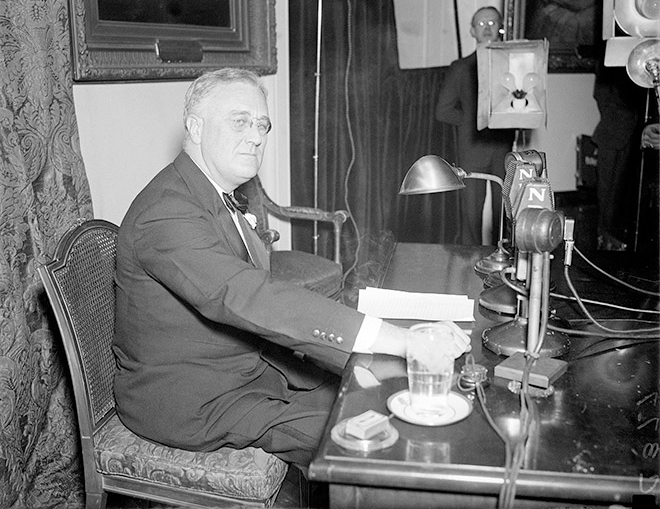NEWSLETTER
|
Past leaders showed how to deal with crises By Arthur I. Cyr
This article appeared originally in The Chicago Sun Times on March 24 and is reprinted here, slightly edited, with permission.
“So, first of all, let me assert my firm belief that the only thing we have to fear is fear itself.”
This quotation is from the First Inaugural Address of President Franklin D. Roosevelt. The speech capped the ceremony in which he took the oath as chief executive officer of the United States on March 4, 1933.
The American economy was in a state of collapse, and much of the world gripped in depression. Overseas, many people embraced dictatorship. The new president immediately launched an unprecedented effort to use government to address our problems.
In the crisis of the Great Depression, as in other major challenges, leadership was central. FDR’s struggle to overcome paralysis of his legs from polio is relevant. The speech went on to describe “nameless, unreasoning, unjustified terror which paralyzes needed action”.
Today, we expect government to provide leadership, and a lot more. Until the twentieth century, catastrophes were regarded as unavoidable “Acts of God”. People addressed the 1918 Spanish flu pandemic with stoicism.
The mass media have played a steadily more important role in characterizing terrible events. Photography transformed newspapers by adding sometimes-shocking pictures to text.
Radio and television greatly expanded this impact of information. The Internet and cell phones carry the process further.
Simultaneously, Americans have steadily raised the bar regarding expectations of government. President George W. Bush suffered serious political damage from public perception that he was both ineffective and uncaring in handling Hurricane Katrina’s devastation in 2005.
A century earlier, another President Roosevelt, Theodore, established the precedent of direct White House involvement to mitigate major disasters. This occurred immediately after the 1906 San Francisco earthquake. His initiatives included a quick Congressional appropriation of $2.5 million, a radical move as well as substantial sum for that time.
Teddy Roosevelt also involved the military in humanitarian relief. The U.S.S Chicago rescued 20,000 people, still one of the largest amphibious evacuations in history. Soldiers distributed food, water and medical supplies. Military methods also restored order. An estimated five hundred looters were shot by soldiers and police, including thirty-four men who attempted to rob U.S. Mint and Treasury buildings that contained $239 million in bullion and cash.
There was no FEMA (Federal Emergency Management Agency), created during the Carter administration. Roosevelt instead stressed the role of the Red Cross.
Herbert Hoover further developed U.S. disaster relief capabilities and involvement, including overseas humanitarian efforts. During and after the First World War, he led the substantial U.S. Food Administration and American Relief Administration, credited with preventing mass starvation in Europe.
In 1927, Commerce Secretary Hoover spearheaded an enormous humanitarian effort after huge Mississippi River flooding. Hoover was confirmed—temporarily—as a Great American Hero, securing a lock on the 1928 Republican nomination and election to the White House.
In 1965, Hurricane Betsy became the first Gulf Coast storm creating more than $1 billion in damage. President Lyndon Johnson immediately flew to New Orleans and relentlessly, endlessly visited storm victims, slogging through water to isolated shacks, anxious Secret Service agents and local politicians in tow. Follow-up federal relief was comprehensive.
During relief efforts after the 2010 Haiti earthquake and Hurricane Sandy in 2012, the Obama White House web site linked to the Red Cross.
Today, while varied volunteer agencies are heavily engaged in anti-coronavirus efforts, we assume government is central in dealing with the coronavirus.
In facing this public threat, as in the past, mature, insightful leadership is crucial.
Arthur I. Cyr is Clausen Distinguished Professor and Director of the Clausen Center at Carthage College in Kenosha, Wisc., and author of After the Cold War. He worked at the Ford Foundation from 1971 to 1974 in the Office of European and International Affairs and, from 1973 to 1974, for the Public Policy Committee.
|


